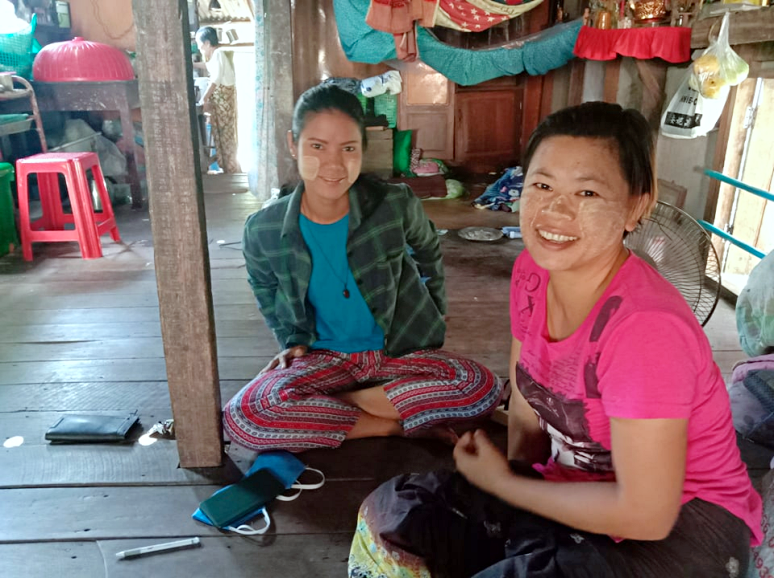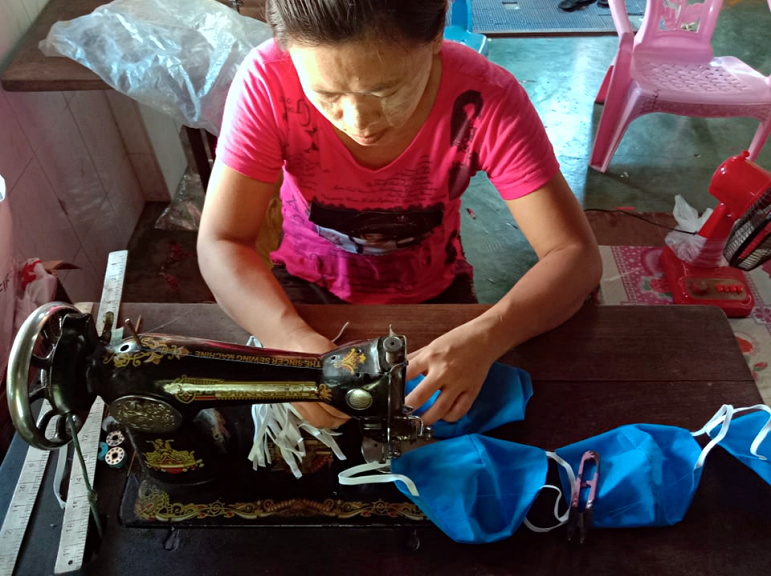From Sewing Sanitary Napkins to Three-layer Face Masks
“Kacha…Kacha…” Theit Theit Shwee, a woman from the slum area of Myanmar, sat in front of a sewing machine and sewed the fabric. She carefully wrapped the two white bands and sewed them with the fabric and finished making a three-layer cloth mask. This has been her daily job, making cloth masks with other women in the community center of CEDAR’s partner.
Due to the local outbreak of COVID-19, Theit Theit Shwee, who was already over 40, immediately lost her job. She had been working so hard to raise her child for many years, but the pandemic has made her lose all her income. She could no longer pay for the rent and could only take her child to live with her relative. Fortunately, with the help from CEDAR’s partner, she can now work in a community center and earns 5,000 Kyats a day (equivalent to HK$28, which is around the daily wage of a low-level worker in local factory). Seeing such situation, our partner also provided free food for her and her child to help her through such difficult times.
The situation of Theit Theit Shwee is a portrayal of many poor people in Myanmar. Apart from the threats to the public health in slum areas, the pandemic has also severely hit the livelihoods of the working class, as for most poor people are living from hand to mouth. Understanding the double impacts of the pandemic on poor communities, our partner mobilised slum women to set up a cooperastive to sew cloth masks and make liquid soap at the early stage of the outbreak. In the beginning, they provided masks and liquid soap for residents in the surrounding communities. But gradually they have received orders from various units, including medical institutions, government departments, police offices, embassies of foreign countries, and even non-governmental organisations.
After learning the vocational skills from our partners, the women in slums can be mobilised quickly and produce anti-virus supplies even earlier than local businesses. Since last year, CEDAR has been supporting our partner in training women to make soap or sew sanitary napkins in slum areas, which not only benefited the residents of the community, but also enabled the women to have skills to make a living. Under the pandemic, they have used the learned skills to respond to the huge needs of the communities, and have engaged other women in the production process. With the support from the Ministry of Health, their cloth masks have obtained official certification and received many orders.
Delivery of Material as a Timely Help
In 2020, the COVID-19 pandemic is raging around the world, bringing a major public health crisis to all regions. At the beginning of February this year, CEDAR saw the lack of anti-pandemic supplies in Mainland China, where the initial outbreak of the coronavirus occurred, and the people there were in worries. Hence, CEDAR urgently allocated about HK$513,000 to support two partners in China to provide anti-pandemic support in Hubei, Yunnan and Sichuan provinces.
Part of the anti-pandemic relief work is the distribution of anti-pandemic supplies. A Chinese social worker who participated in the project expressed his gratitude and impression for receiving CEDAR’s anti-pandemic items. It filled her heart with warmth and joy.
In late January, the social worker was in Suizhou, Hubei Province, only 160 km away from Wuhan. The number of confirmed COVID-19 cases in that area had risen sharply, and the epidemic had continued to break out, but virus prevention materials were in short supply. She described it as if “all the supplies seemed to have disappeared from the market for a while.”
Soon, the Suizhou authorities announced the lockdown of the city, and the transportation of supplies became more difficult. Courier companies stopped the shipping and the virus prevention materials that had been purchased were not arriving as expected, making the situation even worse. Even though she persisted in helping the community to fight the pandemic, the fact that virus prevention supplies were in short supply made her unable to do so.
Under the lockdown order, she inevitably felt lonely and helpless. Without supplies and support, she described the people in Suizhou City as if they were abandoned by the outside world. At this moment, CEDAR sent the first batch of anti-pandemic supplies – 480 pairs of goggles.
This timely help made her very excited. She said, “We are not fighting alone! You have strengthened our confidence in defeating the pandemic!” She then sent these goggles to the “frontline battlefield.” When the medical personnel in the communities wore these goggles we presented, they all smiled and expressed gratitude.
We have distributed 51,000 face masks, 5,000 pairs of gloves, more than 1,400 pairs of goggles, more than 1,200 bottles of alcohol, 450 kg of disinfectant tablets and 400 sets of protective clothing.
In addition to pandemic prevention personnel, the beneficiaries also include medical staff, public welfare agency staff and volunteers, civil servants who are on duty, security guards, cleaners, the elderly and people from poor families. More than 8,000 people and 160 organisations were benefited.
While distributing supplies, we also visited 24,400 households. We recorded their health information and assisted the local government in further analysis.
As the pandemic in China gradually slowed down, people there no longer faced shortage of supplies. . People in the cities have resumed work, but this social worker has not stopped fighting the pandemic.
With a grateful heart, she continued to distribute the masks and protective clothing we presented to the local clinics. CEDAR is also grateful for her and the volunteers of our partners in walking together in this anti-pandemic project.








